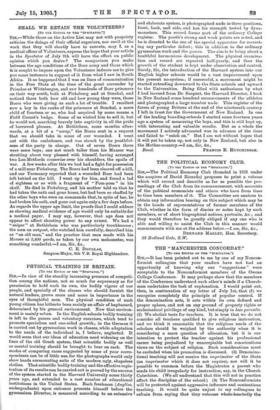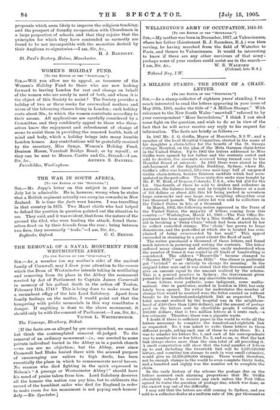Sig,—It has been pointed out to me by one of
my Noncon- formist colleagues that your readers have not had an opportunity of knowing why our " suggestions " were acceptable to the Nonconformist members of the Owens College Conference. It may perhaps show that the members of the Conference understood each other's minds if a Church- man undertakes the task of explanation. I would point out, then, in continuation of my letter of July 1st, that (1) we recognise completely the principle of popular control. If the denomination acts, it acts within its own defined and proper sphere, and not on any ground of property rights or ecclesiastical privilege of any kind, but simply in loco parentis. (2) We abolish tests for teachers. It is true that we do not consider all teachers qualified to give religious instruction, and we think it reasonable that the religious needs of the scholars should be weighed by the authority when it is considering a mere question of allocation, but it is our intention to protect the teacher against his professional career being prejudiced by unacceptable but conscientious views on the subject of religion. Such considerations must be excluded when his promotion is discussed. (3) Denomina- tional teaching will not receive the imprimatur of the State (an imprimatur which it does not require), nor will it be possible to summon before the Magistrates a parent who sends his child irregularly for instruction, say, in the Church Catechism. (We all understand that this will not in practice affect the discipline of the schooL) (4) The Nonconformists will be protected against aggressive influence and contentious teaching. It would be quite unjust to my colleagues to refrain from saying that they welcome whole-heartedly the proposals which seem likely to improve the religious teaching, and the prospect of friendly co-operation with Churchmen in a large proportion of schools, and that they rejoice that the principles for which they have contended BO earnestly are found to be not incompatible with the securities desired by their Anglican co-signatories.--I am, Sir, &c., H. J. BARDBLEY.







































 Previous page
Previous page